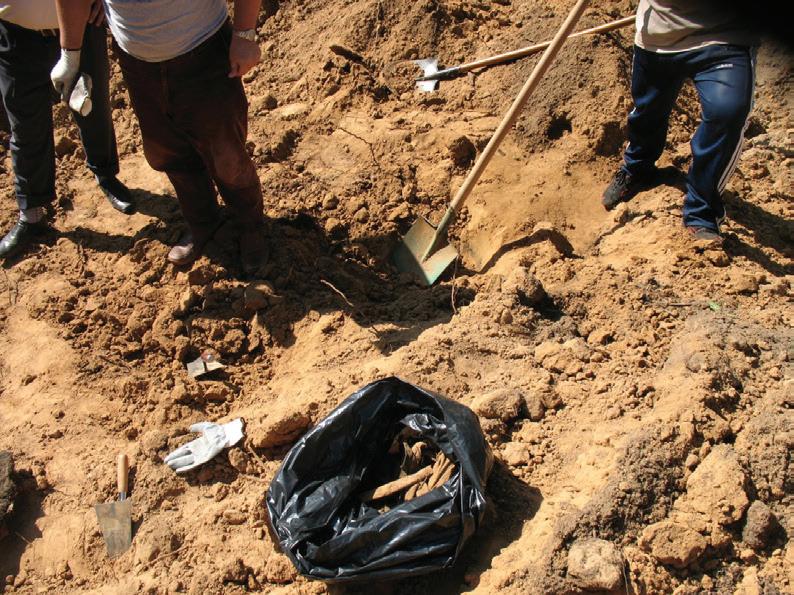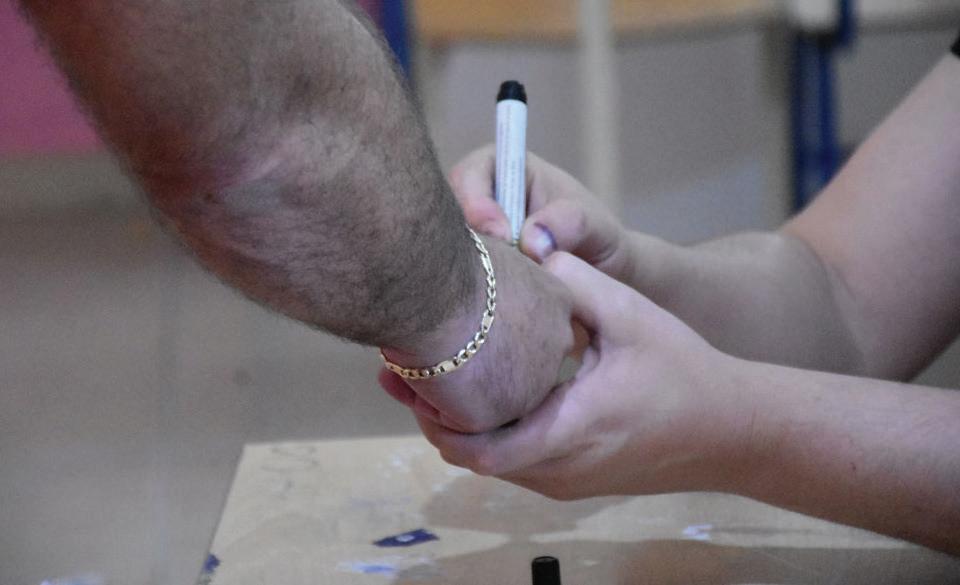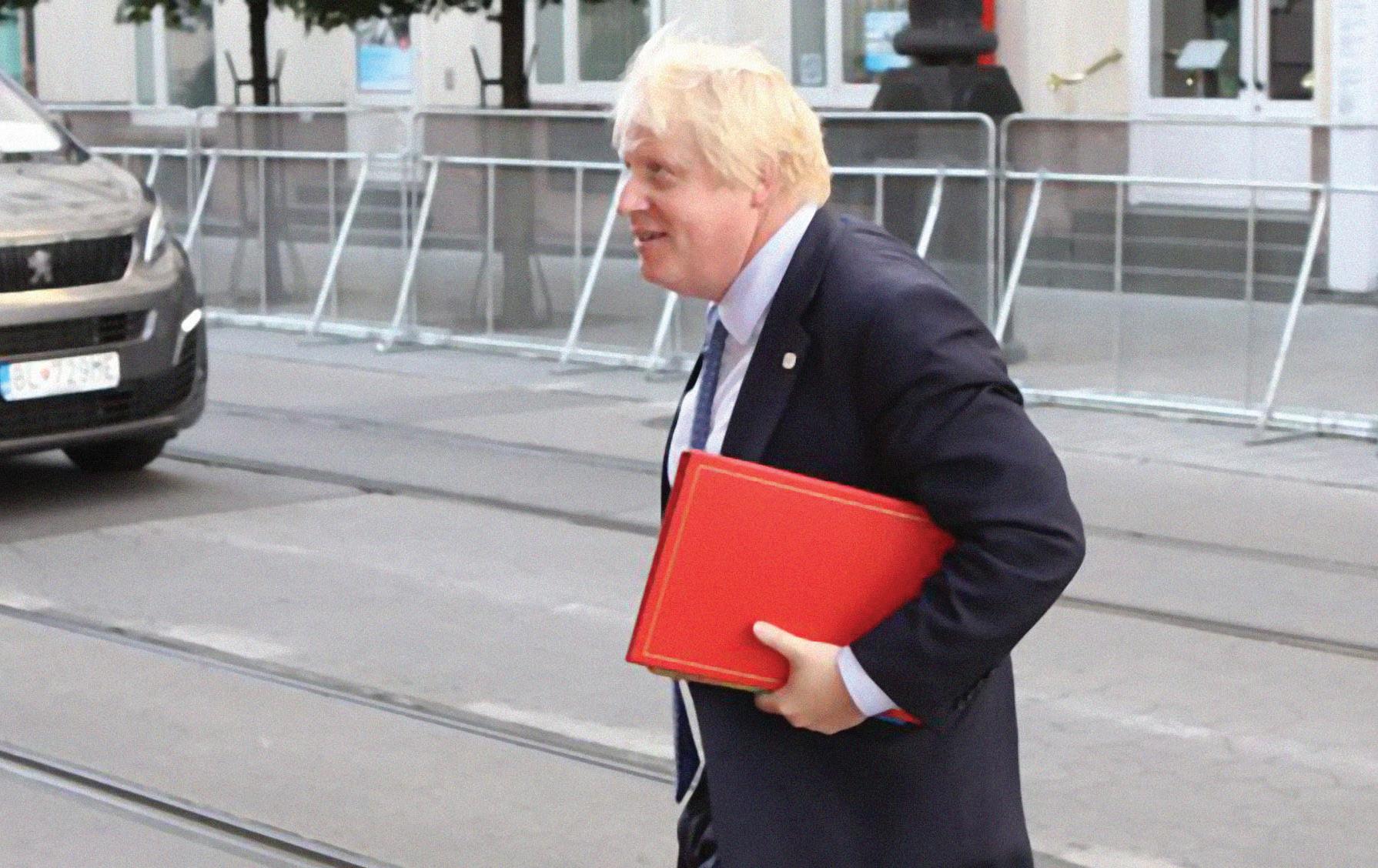
18 minute read
DEEPLY DIVIDED ALBANIA BRACES FOR TURBULENT ELECTION

Albania to “redouble its efforts to effectively shed light on enforced disappearances that took place during the communist regime”. Albania should investigate these crimes, prosecute those responsible and provide reparations to the victims and their families, the committee said.
Advertisement
The ICMP is offering to help at the Mount Dajti and Ballsh sites with funding from the European Union, but it took heavy diplomatic pressure for the Albanian government to even approve a cooperation agreement with the organisation in 2018.
Critics say that government efforts have focused on glitzier projects, such as the former military bunker Bunk’Art and the former Sigurmi listening centre, the House of Leaves. Both projects help to illuminate the past but largely cater to a foreign crowd. They do little to soothe the suffering of roughly 6,000 families who seek comfort, closure and compensation.
Since 1991, the approach of all governments, Socialist and Democratic, has been “calibrated not to irritate the old guard”, said one diplomat who followed the issue.
Despite appeals for the parties to observe international standards, there are fears that this April’s elections will see more polarisation and aggressive language than usual – and even violence.
FJORI SINORUKA |BIRN | TIRANA
The campaign for the April 25 parliamentary elections in Albania may not have officially started – but already the programmes of the parties in a country suffering from a high rate of youth migration, poor health infrastructure and economic crisis are at the centre of public discourse.
On Tuesday, the US Deputy Assistant Secretary of State, Matthew Palmer, sent a clear message to Albania’s political leaders to focus on upholding election standards.
Such standards have “significant importance for US-Albania relations”, Palmer told Voice of America, VoA. “We want new [election] legislation to be implemented and the April elections to be done in accordance with highest international standards,” he warned. Despite such messages, analysts predict that this year’s campaign will be even more troubled and problematic than the last one four years ago.
“This campaign is expected to be tenser than the one in 2017 when the result, in a way, was known before the elections, and when the campaign was more of a political show than a rivalry between parties,” Afrim Krasniqi, from the Institute for Political Studies, a Tirana think tank, told BIRN.
On March 12, President Ilir Meta seized public attention when he physically intervened to stop the Tirana police from storming the offices of a small party, New Democratic Spirit, FRD, on the grounds that its contract to use the premises had expired.
The party had been an ally of the governing Socialist Party in the city government, but the police action – suspiciously – came only days after it signed a pre-election coalition with the opposition Democratic Party of Lulzim Basha.
In the last few years, the President has become one of the most vocal critics of Socialist Prime Minister Edi Rama’s government, often siding with the opposition and with street protests held against it.
After clashing in person with the city police, Meta told them to clear out, and was heard warning: “Leave, or I will put you in jail with my [bare] hands.” That incident was followed up by accusatory statements from both sides.
Days later, the focus shifted to the central town of Elbasan, which has been in the grip of gangs and transformed into a virtual battlefield as a result of gang warfare.
Both Rama and Basha picked the town to visit on March 15, to mark the traditional Summer Day and taste traditional homemade cookies, called “ballokume” – while in the background creating an arena for their respective supporters to clash. Scenes from the town showed predictable scuffles between groups of rival supporters.
Krasniqi said the incident was all too typical, not only for the vulgarity of the party stalwarts but for their brazenness in carrying out violent acts in front of the cameras, their own political leaders and the police.
“None of them has been criminally prosecuted while their criminal records are well known,” Krasniqi added.
In his view, the police silence over the Elbasan incident contrasted vividly with their reaction five years ago, when they arrested student protesters in Tirana for throwing eggs at Rama’s escort. “[In that case] the students ended up in police stations and before the courts – but [now] when there are clear acts of violence, threats and blackmail toward citizens or journalists, there are no investigations or trials,” Krasniqi noted.
Parties with no arguments encourage violence
Krasniqi fears the political parties are not only tolerating but encouraging violence.
“No political party has so far distanced itself from violent acts done by its supporters, and not one person involved in these incidents has been expelled from the party,” he observed. Communications expert Edlira Gjoni says political leaders are using aggressive language “to both distort meaning and confuse the voters”.
“It is alarming to observe this aggressiveness, when voters expected to hear clear, accurate and understandable statements from politicians. The politicians choose this aggressive tone on purpose, as they have no real arguments to put forward,” Gjoni told BIRN.
“It is a known fact in political communication that negative language and a harsh tone of voice causes tangible harms to campaigns and beyond, as it prevents voters from receiving facts and information,” she added.
In Gjoni’s view, the campaign discourse is deepening the polarisation of the public. “This approach fosters misuse of communications, deeper misunderstanding, misuse of the public space, defamation and, worst of all, distrust, anger and resentment among voters.
“It should be taken seriously before it escalates into civic discontent and further hatred,” Gjoni said.
Criminals still lurking on candidates’ lists
The failure to exclude convicted criminals from parliament has long been a concern of the US embassy in Tirana and other diplomatic corps in the country. US Ambassador Yuri Kim has his repeated his concern about this issue, as has his EU counterpart.
The parties have now submitted their candidate lists for the April and elections and the election commission, CEC, is in consultation with the General Prosecutor’s Office, which must verify the candidates.
The law barring convicts from standing for parliament “must be fully implemented and all candidates must meet high standards of integrity,” EU ambassador Luigi Soreca wrote on Twitter a few days ago, referring to the lists submitted to the election commission.
Despite this, the Socialist election lists for the Durrës region reportedly contains three nameslinked to organised crime.
In early March, the Special Court against Corruption and Organized Crime, SPAK, sentenced Adem Lala, the former mayor of Has, in northern Albania, to eight months’ prison, suspended for a probationary period of one year and four months, for “abuse of duty”. He was accused along with a municipal employee of privatizing a public building in Has.
However, as a Socialist Party leader, he was still seen introducing the party’s candidates for MP in the district. Krasniqi maintains that international community pressure forced most of the parties at the last minute to vet their candidates’ lists, before submitting them for certification to the CEC.
However, some parties have used sly tricks to please both the international community and local powerful figures, he adds.
“They compensate for removing [convicted criminals] by including their family members or company employees on the lists instead,” Krasniqi said. “Although some political leaders are still making mistakes, the institutions supposed to protect constitutional and public interests, like the CEC and prosecution, are not succeeding in decriminalizing and cleansing political representation from crime,” he added.
PM Rama in this campaign, in which his party is running alone, is meanwhile asking Albanians for a third term “to continue the projects we have started” – such as justice reform, reconstruction after the 2019 earthquake and continued management of the COVID pandemic.
Meanwhile, Basha and his allies are blamig the government’s bad governance for the mass flight of Albanians from the country, and for poverty, accusing it of corruption and links to organised crime.

A commissioner painting a voter’s finger in Kamza on June 30, 2019. Illustrative photo: Gjergj Erebara / BIRN
The panic created by the COVID-19 crisis has rendered the old distinction between populist and reasonable politicians irrelevant – as the EU vaccine export row illustrates.
Opinion
The pandemic has made some of Europe’s leaders populists
THIMIOS TZALLAS |BIRN | LONDON
It is easy to be the voice of reason when you have the upper hand. For the past five years, the EU held back from populism, reacting with glassyeyed calmness to every Brexit threat from London.
It was obvious that the UK, as the smaller partner in these negotiations, would be more susceptible to compromise. For every explicit escalation of bravado from Downing Street, there was an implicit concession, even if it was disguised as a diplomatic victory for Britain.
But, as soon as the UK started vaccinating people faster than any other country in Europe, the roles were reserved.
Now it was the EU’s turn to resort to populist drama. Under strong criticism from member states for the slow delivery of its vaccination programme, the EU tried to impose a vaccine “border” on the island of Ireland between British Northern Ireland and the Republic. It would have been a knockout blow to the Northern Ireland Protocol, which was presented until yesterday as the holy grail of the negotiations, a no-go area for opportunists.
The fastest route to political acrimony is usually panic. And the coronavirus pandemic has contained all the ingredients needed to tip decision makers into a state of panic. The ferocity and unpredictability of the pandemic has made the distinction between populists and moderates irrelevant.
First, there is an element of populism in the distinction drawn between countries that have “succeeded” or “failed” to stop COVID-19.
It is a narrative that distinguishes between the prudent weak and the arrogant powerful. Britain and Greece have been emblematic examples of this Manichean distinction. During the first months of the pandemic, the UK, one of the most powerful countries in the world, with a topclass science community, was portrayed as a catastrophe in terms of its handling of the virus, mainly because of its PM, Boris Johnson.
Greece, still recovering from its biggest financial crisis since World War II, but with a new anti-populist government, at first managed to keep COVID cases and deaths low. The country was praised as a global role model that other countries could aspire to.
But, by late November, when the pandemic took another one of its many unexpected turns, Greece’s daily death rate was higher than Britain’s or the US’s.
Greece then returned to a draconian

The Prime Minister of the United Kingdom, Boris Johnson. Photo: Flickr. lockdown and the familiar narrative of a struggling, small state. In the meantime, the UK had regained its strength and was at the top of its game – the first Western country to approve a vaccine. It all sounded like a David-and-Goliath story, but with a wrong ending.
Countries that don’t fit this binary narrative are ostracised as examples from the public debate. Belgium, often mocked as a permanently “government-less” small state, is barely mentioned as a prime example of COVID-19 failure. Without a controversial, easily targeted figure at the top such as Johnson, Belgium escaped criticism for having the world’s highest COVID-19 death rate in the autumn.
It’s not just populists that mess up
Things are far more complicated than personifying responsibility for the spread of the virus. Johnson, lazily described as the “mini-Trump” of Europe, is always surrounded by his scientific advisers, Patrick Wallance and Chris Whitty, defying the perception that populists are anti-science. Shaking hands with coronavirus patients on March 7 last year was deeply irresponsible. But that was early March. We hadn’t even picked a name for the pandemic by then.
Seven months later, in November 2020, when panic hit Greece, Michalis Chrysochoidis, the Minister for Citizens’ Protection, in an effort to defend the visible police presence on the streets, claimed that police officers need not worry about COVID-19 because the coronavirus could not be transmitted outdoors. When State Minister Giorgos Gerapetritis was asked if the Greek health system was ready for a dramatic increase of patients, he made the extraordinary claim that an increase in ICUs would just result in more deaths. These politicians are not populists, they just messed up with their messages. It happens. It happened to Johnson and his handshakes. He thought that the right message was not to stigmatise patients and avoid spreading panic ahead of a massive imposition of restrictions. He was wrong – but so were the Greek ministers. Breaching COVID-19 restrictive measures is not the privilege of populists, either. Ireland had its “Golfgate”, a golf society event attended by top politicians, including the EU trade commissioner, Phil Hogan, who then resigned his post. France’s President, Emmanuel Macron, broke his country’s COVID-19 rules last December by attending EU summits and working dinners at the Élysée Palace. The Greek Prime Minister, Kyriakos Mitsotakis, widely deemed a moderate anti-populist – who is credited for paving the way for the comeback of European traditional parties after defeating the radical-left SYRIZA populists – has repeatedly broken his own lockdown rules. In early February, after his government imposed a 6pm curfew, he took part in a gathering with some 40 people. Last December, during the earlier lockdown, he went mountain biking in a forest about 90 minutes’ drive from his home and posed without a mask for some pictures with passers-by.
If it mobilises the public, it’s OK
You don’t have to be a populist to break the rules or mess up with your message. You don’t even have to be a populist to use populist rhetoric to fight the pandemic. Populism can be deployed by mainstream politicians too, to mobilise the public.
When Mitsotakis ordered one of his nationwide lockdowns, he told his fellow citizens that it was time for them to “activate ‘Philotimo’, Greece’s national vaccine”.
An untranslatable Greek word, philotimo is cliché that essentially means focusing on the benefit of others without expecting something in return. Mitsotakis is not the only politician to attribute higher collective values to his nation. Johnson has also flattered his compatriots by appealing to their “solid British common sense” as the most effective weapon against COVID-19.
Greek philotimo, British Common Sense, Irish Protocol. Everyone throws everything they have at the pandemic in order to build public confidence and navigate their way through the crisis. In a dystopian COVID-19 landscape it is pointless to distinguish between populists and mainstream politicians. They are all in this together.
Analysis
It feels like the winds of changing are sweeping across the Balkans. But it will take more than just new faces to halt the region’s regression.
The Times They Are a-Changin’: But For Better or Worse?
VESKO GARCEVIC|BIRN | BOSTON
In a 1998 article in the Washington Post quoted the song “If only there were no war” Serbian singer and lyricist, of the Serbian singer and lyricist Djordje Balasevic, who died in February, believing that a time of change was coming to the region.
Looking back to 1998, I am sure that the progress we wished for has not happened. In fact, after several years of enthusiasm, the economic and political conditions in the region have deteriorated sharply. Membership of the European Union is today almost as distant a prospect as it was 20 years ago. The difference being that we are less confident that it will ever happen.
Today, again, our region is passing through a period that some describe as one of change. The change began with North Macedonia, but it was Montenegro and the fall of the Democratic Party of Socialists, DPS, last year that made global headlines.
With the departure of Hashim Thaci, Kosovo’s former president, to The Hague in November 2020 to face war crimes charges, and Vetevendosje’s victory in early parliamentary elections in February, one might think that things will never be the same. It seems that we are putting the years of stagnation behind us and moving forward.
While we need change to prosper, not every change ends how people might want. There is a striking case in the history of the Republic of Florence. After centuries of the Medici family in power, people wanted someone in charge who was not a corrupt, wily politician. They chose Girolamo Savonarola, the Dominican friar known for his hellfire preaching, draconian rules and his plan to transform Florence into ‘the city of God’.
Savonarola quickly became unpopular; his endeavors failed miserably, with the people rebelling and blaming him for their woes. Savonarola did not rule for long. After a year, he was hanged and burned at the stake. The Medici rule was swiftly restored.
Montenegro’s new government racked by infighting
The situation in Montenegro today is grimmer than it looked six months ago. An inward-looking government, consumed by an internal power struggle between ideologically irreconcilable coalition members, staggers from one mistake to another. This has opened the space for political actors and groups who promote the ‘Serbian world’ agenda, na-

Illustrative photo: Pixabay. tionalism or xenophobic narratives.
It is no surprise that the Democratic Front, DF, is gaining ground and looking stronger than ever. After the upcoming municipal elections in Niksic, Montenegro’s second biggest city, if the DF gets the feeling that their time is coming, the current feuding within the ruling coalition may give rise to early parliamentary elections. The party would enjoy the backing of Belgrade in such a step since it could pave the way for Serbian President Aleksandar Vucic to consolidate existing gains in Montenegro.
At this moment, there is nobody to politically articulate the interests of civic-oriented Montenegrins, a large segment of the population but the least represented in parliament.
Though seeking to present itself as the guardian of civic Montenegro, the DPS suffers from a troublesome legacy that will haunt the party for years to come. When your power crumbles, to regain the trust of voters one needs a deeper transformation than just the cosmetic facelift DPS opted for at the last party congress.
Montenegro is not unique. This pattern is pervasive in the region. Illiberal tendencies will continue to grow as long as there is nothing to stop them, and they have a strong driving force behind them – unconstrained nationalism. We are experiencing a revival of chauvinism, hate speech and various forms of discrimination towards ethnic, religious and sexual minorities.
Changing faces is not enough. We lack modern policies, new narratives and value orientation. And I don’t see them on the horizon.
Vaccine diplomacy and the
Those who wrote about how the party of Bosnian Serb nationalist hardliner Milorad Dodik lost November’s municipal election in Banja Luka, the administrative seat of Bosnia’s Republika Srpska entity, omitted to say that the vote was won by a younger, sterner and perhaps more virulent type of nationalist.
Craving for the democratic transformation of their states, many are prone to see democratic potential where it does not exist. One should not forget how the West saw Dodik as a pragmatic politician willing to compromise over Bosnia’s postwar constitutional arrangement.
Belgrade, decades ago a beacon of liberal thought in Yugoslavia, has become the epicentre of illiberal regional policy. The popular narratives, public discourse and nationalistic scenography are almost identical to the late 80s and early 90s of the 20th century. The political plurality in the country is as stagnant as it was at the time, while freedom of expression is at its lowest level in the last 40 years.
In the book Power in Interpersonal Conflict, Joyce Hocker and William Wilmot Burton argue that “power depends on controlling currencies that other people need”. If the other side has the currency you need, it possesses power over you.
Right now, the one who possesses vaccines has the currency you need and the power over you.
The vaccine drama has given Belgrade a golden opportunity to mimic China’s ‘health diplomacy’, presenting itself as a saviour of those in need.
Vaccines have turned into a tool of geopolitics in the region, first wielded by China and Russia and then by Serbia, which is replicating their crisis management model to enhance its regional influence. However, one must concede that Belgrade’s vaccine policy is almost as successful as the Chinese or Russian.
The newly-born concept of the Serbian world is the old idea of the great, powerful Serbia refurbished and repacked. Those who want to devalue the project and its feasibility describe the ‘Serbian world’ as a pale, imitative Russian world-like idea. But I would take it with the same seriousness as I would the idea of a Russian world. By delivering vaccines, Serbia is redrawing the map of the Serbian world.
EU in sleep mode
Oddly, given the fact that the EU is in sleep mode when it comes to the Western Balkans, this concept of corporate, illiberal governance seems to be bearing fruit. This brings me to the point about the EU’s responsibility for the situation in the region as it is also a question of the credibility of the Thessaloniki agenda, when the EU in 2003 vowed that the future of the Western Balkans lay inside the bloc.
One could rightly say that, during the Yugoslav wars, Brussels got lost in our bloody Balkan maze. It could have done more to stop the war. It was often one step behind events. And yet, at the time, European Commission officials were focused on the problem and trying to address it as efficiently as they could.
This time, Brussels appears barely concerned about the steady deterioration in the region.
Its involvement often ends with press releases talking of the need for countries to do more or to redouble their reform efforts. Given the growing presence of Moscow and particularly Beijing in the EU’s backyard, an approach based on the premise that the embargo on the opening of an EU negotiation chapter is a means to deal with regional challenges is not working well.
I do not want to believe that the EU appears not to be paying attention to our region because ‘things have not yet spiraled out of control’. That would mean the worst has not yet happened.




